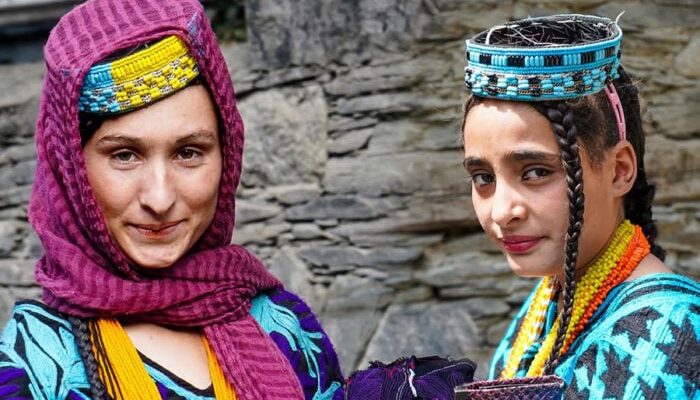The Kalash tribe of Pakistan, often believed to be descendants of Alexander the Great’s soldiers, presents a fascinating cultural enigma. As modern influences threaten their unique traditions, their story remains a poignant reminder of the fragility of cultural heritage in an increasingly globalized world.
The people of the Kalash tribe, who live in the Chitral district of Pakistan, believe they are descendants of Alexander the Great’s troops who settled in the area about 23 centuries ago. Numbering only about 4,000, their unique culture is in danger of extinction.
The Kalash are a small ethnic and religious community with many characteristics which distinguish them from the surrounding population. Many of the Kalash are fair-skinned and blue or green-eyed, and these features contribute to the age-old legend that they are indeed descendants of Greek soldiers who fought alongside Alexander the Great in Pakistan around the year 300 B.C.
Surrounded by Muslim communities, the Kalash have nevertheless kept their ancient customs and practices. They are polytheists who worship many gods, much like the ancient Greeks, and nature plays an important and spiritual role in their daily life.
As part of their religious tradition, animal sacrifices are offered and festivals are held to give thanks for the abundant resources of their three valleys.
Their polytheism, mythology and folklore have all been compared to that of the ancient Greeks. Yet in reality they are much closer to Indo-Iranian (pre-Zoroastrian-Vedic) traditions.
The Kalash celebrate three festivals in a year which have become a tourist attraction in the region. During the festivals, the Kalash drink homemade wine and dance to the sound of drums — activities that are strictly forbidden to Muslims.
Also, unlike Muslim women, Kalash women are not only allowed to choose their own husbands, but they can also divorce them and are even allowed to elope.
Kalash tribe and traditions in danger of extinction
Yet, despite all the differences with their Muslim neighbors, the Kalash are in danger of being absorbed by them. Their traditions are quickly becoming extinct, as many convert to Islam.
In the 19th and early 20th centuries, many Kalash were converted to Islam by force. Even today, there are media reports of forced conversions and forced marriages with non-Kalash people.
In addition, modern culture is catching up with the newest generation, and Kalash culture is being eroded from within. Young people are adapting to new and modern ways. Many who desired to obtain a formal education and enjoy modern careers have left the region to work in various professions.
Other factors that threaten their unique culture include illegal logging and land encroachment. The Kalash community is pressured economically, and many of its members are forced to abandon their traditions to find work in the outside world.
Often feeling marginalized in their new region, more and more give up their culture in order blend in and to survive in the modern world.
Human rights organizations have been campaigning since 2008 to include the Kalash culture in UNESCO’s Intangible Cultural Heritage List, but efforts have now stalled.
The Pakistani government has also been making an attempt to protect and preserve the Kalash culture. The authorities worry that it is under threat from exploitative tourism, which is getting worse as every year more and more tourists arrive for the festivals.
The laws of Pakistan ensure equal rights to minorities, so Kalash customs are legally protected, which has helped their many centuries-old practices to survive so far. And thankfully there are Kalasha traditionalists who are determined to preserve their unique culture, in a world that seems likely to swallow them up and make them disappear forever.
The Ongoing Debate on Kalash Origins
The Kalash people’s connection to Alexander the Great’s army has long intrigued historians and geneticists. Recent studies, however, offer mixed evidence, with some genetic research suggesting a more complex ancestry involving a mix of local populations and influences from other regions.
- Genetic Research: DNA studies have revealed that while the Kalash possess some genetic markers common in populations of European descent, their ancestry is more likely a result of ancient migrations rather than direct descent from Alexander’s troops.
- Cultural Preservation Efforts: As the Kalash culture faces threats from modernization and religious conversion, international organizations have intensified efforts to preserve their unique heritage, including renewed attempts to secure UNESCO recognition.
- Impact of Tourism: While tourism provides economic benefits, it also poses risks to the Kalash way of life, as increasing exposure to outside influences accelerates cultural erosion.



